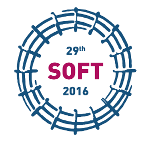Speaker
Dimitris Valougeorgis
(Mechanical Engineering)
Description
Recently, an integrated software algorithm for modeling gas distribution systems operating under vacuum conditions has been developed [1]. It has been successfully applied to model the 2012 ITER divertor pumping system and results have been provided for the flow patterns in the cassettes and the divertor ring, as well as for the throughputs in the burn and dwell phases. In all cases the input pressures at the boundaries of the network, representing the pressure distribution in the dome, have been taken to be constant, assuming steady-state conditions. In several ITER gas pumping scenarios however, the data are varying with time and the whole set-up requires a transient approach. A typical example is the dwell phase operation with the dome pressure reducing with time down to a start-up value before the next plasma shot.
In the present work, the time-dependent behavior of gas distribution systems subject to transient boundary conditions is simulated. Since the characteristic time in the torus is several orders of magnitude larger than that in the pumping system, the evolution of the flow throughput is modeled in a hybrid manner [2]. At each time step, based on kinetic modeling, a steady-state flow configuration is solved to estimate the amount of gas passing through the network and then the pressure of the vessel is updated by applying the mass conservation principle and the equation of state. As the dome pressure is reduced with time, the flow becomes more rarefied and consequently, the gas flow towards the cryopumps is also reduced, affecting significantly the pump performance and the overall time needed to evacuate the vessel. The elapse times between pulses are computed assuming various initial and base pressures for several pumping scenarios.
[1] N. Vasileiadis et al, FED, 103, 125-135, 2016.
[2] M. Vargas et al, JVSTA, 32, 021602, 2014.
Co-authors
Dimitris Valougeorgis
(Mechanical Engineering, University of Thessaly, Volos, Greece)
Nikos Vasileiadis
(Mechanical Engineering, University of Thessaly, Volos, Greece)

